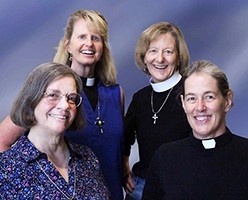 Clergy from left, Deacon Cynthia Biddlecomb, retired; Pastor Nicolé Ferry, Assistant Rector Lynn Finnegan and Pastor Deb Church. Courtesy photo
Clergy from left, Deacon Cynthia Biddlecomb, retired; Pastor Nicolé Ferry, Assistant Rector Lynn Finnegan and Pastor Deb Church. Courtesy photo
By DEACON CYNTHIA BIDDLECOMB
ELCA
Who is responsible? We’ve all heard the comment, “Somebody really should do something about that!” But who is that “somebody,” really? Do individuals have any responsibility for the way things are? Certainly, in this town, there are lots of ideas about what “somebody” ought to do about “the way things are,” but is it helpful to complain without lifting a finger?
In Hebrew Scripture, the Prophets write about failing to live up to God’s expectations and the consequences of that failure. Divine expectations are summarized throughout the Torah in 613 laws, including the well-known “top ten” list (Exodus 20/Deuteronomy 5). By the time of Jesus, rather than being enforced by religious authorities, God’s laws ought to have been suffused into the daily consciousness of the faithful. Living within their guidelines, a person of faith and entire communities of faith might live in Grace rather than anxiety.
What is often ignored when quoting the Prophets is that they are speaking to a community. A prophet would take an individual aside if their prophetic message was meant for that one person alone. (For an example, see the Second Book of Samuel, Chapter 12.) The writings of the biblical Prophets are meant as correctives, explanations of consequences, written to whole communities of people, showing what to avoid or where they went wrong.
Law is something we humans like to throw at those whose behavior impacts, or at least annoys us. But what if we looked at Law as originally intended: for the benefit of the community? We seem to have found the term “the common good” archaic, especially in this world where benefits to the individual reign supreme. But, anyone “looking out for number one” should take a moment to consider how our actions (or lack of action) might impact those around us.
Biblical laws, taken out of context and thrown at other people, were originally written down to help the community of faith live together in peace. The Common Good we seek is a measure for keeping everyone in the community safe from harm and able to function responsibly, within the community. When any one person doesn’t have enough food, shelter, or clothing, that person’s gifts and skills get diverted for survival; they can’t contribute much to community.
In this “Land of the Free,” we too often hear that freedom means “I can do whatever I damnwell please!” Yet, Jesus did not come to set us free from community, or from sharing ourselves in community. Jesus came to show us what the fruits of love look like, what a community of care and concern for the neighbor looks like. And, that it is possible for we otherwise-self-centered humans to live together in human community.
We are called to repent as communities and as a nation, not just as individuals. How would our country change if we stopped obsessing about our own individual freedoms? Taking it to another level, how might our worshipping communities be transformed if we each took responsibility to share our God-given gifts and abilities for the benefit of the whole?

